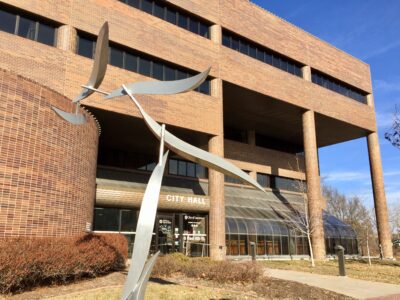City delays action on fire codes for animal facilities
Lawrence city commissioners agreed Tuesday to wait until early next year before adopting new fire safety codes that would apply specifically to businesses that house animals. But it remains unclear whether those new codes will include requirements to install automatic sprinkler systems.
Commissioners have come under pressure in recent months to strengthen those codes in the wake of two fires in the past year — one at a kennel and another at a pet store — in which numerous animals perished from burns and smoke inhalation.
“We failed the Lawrence community, and we are ashamed and we are sorry,” said Sherry Emerson, owner of Pet World at 711 W. 23rd St., the site of a fire in May.
Emerson was one of several residents urging commissioners to immediately require automatic sprinkler systems in all animal housing facilities, including pet stores, animal hospitals, kennels and other facilities.
.@PetWorldKansas Sherry Emerson sez most animals in her fire died of smoke inhalation. #LawrenceCitComm pic.twitter.com/iFJIYrBbFH
— Peter Hancock (@LJWpqhancock) September 1, 2015
The Lawrence fire department said the after-hours fire at Pet World was caused by an electrical malfunction. The building had smoke and fire detectors, but those were not integrated with an alarm system that would have automatically contacted firefighters.
Emerson said that in addition to the deaths of many animals, the fire caused an estimated $500,000 worth of property damage to the building.
But some local veterinarians argued that it would be cost-prohibitive for them to install sprinkler systems, and those systems would not provide additional safety in their clinics.
Kristi Rowland, of the Wakarusa Veterinary Hospital, 1825 Wakarusa Drive, said an integrated alarm and sprinkler system would cost between $75,000 and $100,000 and would cause that clinic’s insurance rates to increase.
She said that unlike pet stores and pet groomers, veterinary clinics have surgical rooms and expensive laboratory equipment that could be damaged or destroyed if a sprinkler system ever went off by mistake.
Gary Olson, of the Clinton Parkway Animal Hospital, 4340 Clinton Parkway, argued that Lawrence has seen little population growth in recent years. And without new families moving into town with their pets, he said veterinary clinics could never afford the increased cost of installing and maintaining sprinkler systems.
But Lawrence-Douglas County Fire Medical Chief Mark Bradford said he believed firmly that sprinkler systems should be required.
“I would think that we would want to do at least the minimum for animals as we try and do for us,” he said.
City staff had recommended what appeared to be a compromise package, requiring sprinkler systems on all new or remodeled facilities larger than 3,000 square feet, while requiring all facilities regardless of size to have smoke detectors and monitored alarm systems.
But commissioners were reluctant to go even that far Tuesday night, at least not before investigating other possibilities.
“If we’re causing widespread closing of veterinary clinics, we’re not doing a service to animals,” Commissioner Matthew Herbert said. “The thing I’m afraid of is, in an effort to do the right thing, we’re going to do the wrong thing. Wish somebody else was up here to make this choice.”
Responding to Olson’s comments, Herbert said the city should be careful about imposing costly new requirements on animal hospitals.
“At a veterinary facility, you’re saving pets every single day,” he said. “And if we’re putting you in a situation where we’re causing widespread closings of veterinary clinics, we are not doing a service to animals.”
Mayor Mike Amyx said he didn’t think that all animal facilities should be treated the same because not all are exposed to the same level of risk. He said pet groomers, for example, which typically do not house animals overnight, should not be put in the same category as kennels, pet stores and animal hospitals.
In the end, the commission agreed to have an ordinance drafted that would enact three lesser regulations that would apply retroactively: that all facilities have smoke, fire and carbon monoxide detectors integrated with fire alarm systems; that they all have fire extinguishers and train their staff in how to use them; and that they all have disaster and emergency management plans and conduct drills with their staff.
Those rules will be incorporated into a comprehensive fire code revision that the commission is scheduled to consider in January. In the meantime, Amyx said, commissioners will continue to consider what, if any, type of sprinkler requirements the city should enact.
In other business, the commission:
• Granted a waiver of $44,937.81 in special assessments for a vacant parcel in the East Hills Business Park, on the condition that Douglas County give that parcel to Prosoco, Inc., at no cost to accommodate a planned expansion and new business venture by that company.
• Appointed Joe Harkins as chairman of the Advisory Committee on the City Commission Vacancy.
• Received a report from City Auditor Michael Eglinski recommending steps the city should take to protect personally identifiable information on city computers and databases.
• Received a report from Eglinski about an external quality control review of the City Auditor.
• And authorized payment of federal taxes and interest totaling $51,549 owed to the IRS as a result of interest the city earned in excess of interest paid on proceeds of tax exempt municipal bonds.






